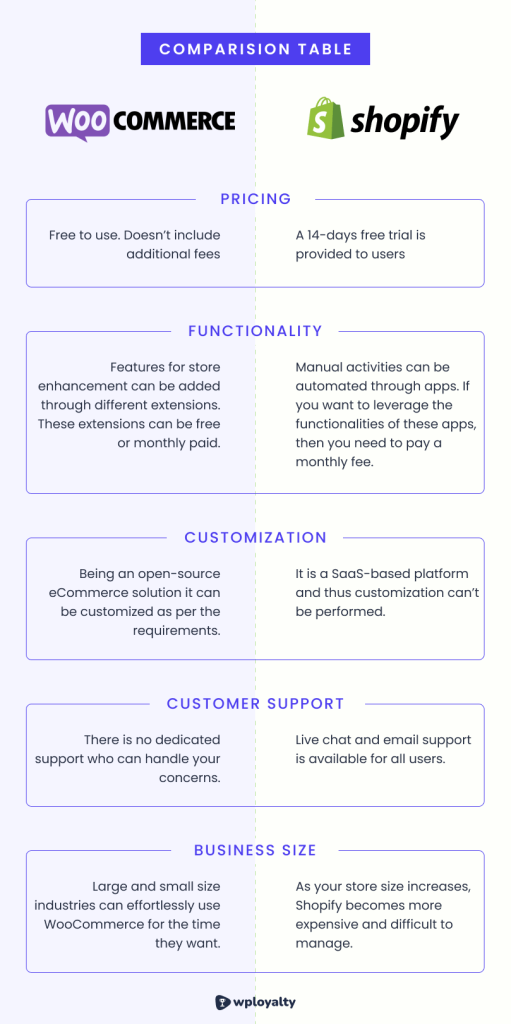With global eCommerce sales skyrocketing to $5.8 trillion, there’s no better time to launch an online store. Choosing between WooCommerce and Shopify can be challenging, but this guide will help you decide by comparing their features, pricing, and ease of use.
WooCommerce vs Shopify: An Overview
WooCommerce
WooCommerce is an open-source plugin for WordPress, making it a flexible choice for those already using this popular CMS. It offers extensive customization options and is suitable for businesses of all sizes.
Shopify
Shopify, founded in 2006, is a hosted eCommerce solution designed for ease of use. It’s an all-in-one platform that allows you to create, customize, and manage your online store without worrying about the technical aspects.

WooCommerce vs Shopify Pricing
When comparing WooCommerce vs Shopify pricing, Shopify offers transparent plans starting at $39 per month for Basic Shopify, $105 for Shopify, and $399 for Advanced Shopify. These plans include hosting and SSL certificates. WooCommerce is free to use, but you’ll need to pay for hosting, a domain name, and any premium themes or plugins you might use.
WooCommerce vs Shopify Features
Shopify Features
Shopify provides everything you need out-of-the-box, including hosting, a shopping cart, and payment processing. It supports multiple sales channels like Facebook, Instagram, and Amazon.
WooCommerce Features
WooCommerce is highly customizable, offering a wide range of plugins and themes. You have complete control over your site’s design and functionality. Partnering with a professional WooCommerce expert can help you implement advanced features, custom integrations, and performance enhancements aligned with your business goals.
WooCommerce vs Shopify Ease of Use
Shopify Ease of Use
Shopify is known for its user-friendly interface, making it ideal for beginners. You can set up your store quickly without needing technical skills.
WooCommerce Ease of Use
WooCommerce has a steeper learning curve, especially if you’re not familiar with WordPress. However, it offers a setup wizard and extensive documentation to guide you through the process.
WooCommerce vs Shopify SEO
Both platforms are SEO-friendly, but WooCommerce has a slight edge due to its integration with WordPress, allowing for more advanced SEO techniques. Shopify also offers robust SEO features, but you might need additional apps to achieve the same level of customization.
WooCommerce vs Shopify Customization
WooCommerce Customization
WooCommerce shines in customization, with thousands of themes and plugins available. You can tweak every aspect of your store to match your brand’s unique style.
Shopify Customization
Shopify offers a more curated selection of themes and apps. While not as flexible as WooCommerce, it ensures high quality and ease of use.
WooCommerce vs Shopify for Small Businesses
WooCommerce for Small Businesses
WooCommerce is a great choice for small businesses looking for a cost-effective solution with high customization potential.
Shopify for Small Businesses
Shopify’s simplicity and comprehensive features make it an excellent option for small businesses that want to get started quickly and easily.
WooCommerce vs Shopify for Large Stores
WooCommerce for Large Stores
WooCommerce can handle large stores with extensive product catalogs, thanks to its scalability and customization options.
Shopify for Large Stores
Shopify also supports large stores but may incur higher costs due to transaction fees and premium app subscriptions.
WooCommerce vs Shopify for Digital and Physical Products
Both platforms are capable of selling digital and physical products. WooCommerce’s flexibility makes it easier to customize the selling process for digital products. Shopify, on the other hand, excels in handling physical products with its robust inventory management and shipping integrations.
WooCommerce vs Shopify for Dropshipping
WooCommerce for Dropshipping
WooCommerce supports dropshipping through various plugins, allowing you to connect with multiple suppliers.
Shopify for Dropshipping
Shopify is also dropshipping-friendly, with dedicated apps like Oberlo that streamline the process.
WooCommerce vs Shopify Security
WooCommerce Security
Security in WooCommerce depends on your hosting provider and the security plugins you install. You have control over your store’s security measures.
Shopify Security
Shopify handles security for you, providing SSL certificates and PCI compliance. This makes it easier for beginners to maintain a secure store.
WooCommerce vs Shopify Support
WooCommerce Support
WooCommerce offers extensive documentation and community support. Premium support is available through hosting providers and paid extensions.
Shopify Support
Shopify provides 24/7 support via phone, chat, and email, making it a reliable option if you need immediate assistance.
WooCommerce vs Shopify Performance
Performance can vary based on your hosting provider for WooCommerce. Shopify generally offers consistent performance since it’s a hosted solution.
WooCommerce vs Shopify Transaction Fees
Shopify charges transaction fees unless you use Shopify Payments. WooCommerce doesn’t charge transaction fees, but you’ll need to pay for your payment gateway’s fees.
WooCommerce vs Shopify Plugins and Themes
WooCommerce offers a vast selection of plugins and themes, giving you more flexibility. Shopify’s app store is smaller but ensures high-quality and compatibility.
Conclusion: WooCommerce vs Shopify
In conclusion, both WooCommerce and Shopify have their strengths. WooCommerce is ideal for those who want complete control and customization. Shopify is perfect for those who prefer ease of use and quick setup. Your choice will depend on your specific needs, technical skills, and business goals.
By considering factors like WooCommerce vs Shopify for beginners, WooCommerce vs Shopify for dropshipping, and WooCommerce vs Shopify for large stores, you can make an informed decision that best suits your eCommerce aspirations.
Frequently Asked Questions
It depends on your needs. WooCommerce offers more customization, while Shopify is easier to use and quicker to set up.
Switch to Shopify for a simpler, hassle-free experience with excellent support and built-in features.
WooCommerce has a steeper learning curve but offers extensive customization and flexibility once mastered.
Move away from Shopify if you need more control over your site’s customization and want to avoid transaction fees.
Both are SEO-friendly, but WooCommerce has an edge due to its deeper WordPress integration.
Yes, you can use both together with plugins or third-party tools to manage different aspects of your business.


